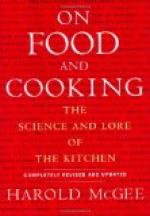Another reason for this prevalence of bad cookery, is to be found in the fact that in so many homes the cooking is intrusted to an ignorant class of persons having no knowledge whatever of the scientific principles involved in this most important and practical of arts. An ethical problem which we have been unable to solve is the fact that women who would never think of trusting the care of their fine china and bric-a-brac to unskilled hands, unhesitatingly intrust to persons who are almost wholly untrained, the preparation of their daily food. There is no department of life where superior intelligence is more needed than in the selection and preparation of food, upon which so largely depend the health and physical welfare of the family circle.
The evils of bad cookery and ill-selected food are manifold, so many, in fact, that it has been calculated that they far exceed the mischief arising from the use of strong drink; indeed, one of the evils of unwholesome food is its decided tendency to create a craving for intoxicants. Bad cookery causes indigestion, indigestion causes thirst, and thirst perpetuates drunkenness. Any one who has suffered from a fit of indigestion, and can recollect the accompanying headache and the lowness of spirits, varying in degree from dejection or ill-humor to the most extreme melancholy, until the intellectual faculties seemed dazed, and the moral feelings blunted, will hardly wonder that when such a condition becomes chronic, as is often the case from the use of improperly prepared food, the victim is easily led to resort to stimulants to drown depression and enliven the spirits.
A thorough practical knowledge of simple, wholesome cookery ought to form a part of the education of every young woman, whatever her station in life. No position in life is more responsible than that of the person who arranges the bills of fare and selects the food for the household; and what higher mission can one conceive than to intelligently prepare the wherewithal to make shoulders strong to bear life’s burdens and heads clear to solve its intricate problems? what worthier work than to help in the building up of bodies into pure temples fit for guests of noble thoughts and high purposes? Surely, no one should undertake such important work without a knowledge of the principles involved.
THE PRINCIPLES OF SCIENTIFIC COOKERY.
Cookery is the art of preparing food for the table by dressing, or by the application of heat in some manner.
FUELS.—Artificial heat is commonly produced by combustion, caused by the chemical action of the oxygen of the air upon the hydrogen and carbon found in fuel. The different fuels in common use for cooking purposes are hard wood, soft wood, charcoal, anthracite coal, bituminous coal, coke, lignite, kerosene oil, gasoline, and gas. As to their respective values, much depends upon the purpose for which they




